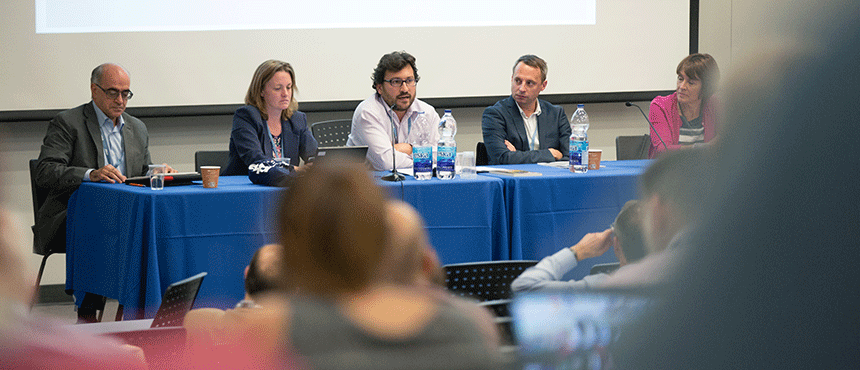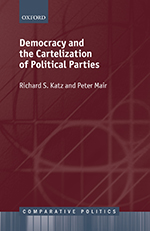Install the app
Install this application on your home screen for quick and easy access when you’re on the go.
Just tap then “Add to Home Screen”
Install this application on your home screen for quick and easy access when you’re on the go.
Just tap then “Add to Home Screen”
Install this application on your home screen for quick and easy access when you’re on the go.
Just tap then “Add to Home Screen”

Democracy and the Cartelization of Political Parties: Responses and Reflections
The 'Plan S' Debate: What does Open Access mean for Political Science?
RLI and ECPR Press, Absorbing the Blow: Populist Parties and their Impact on Parties and Party Systems
The Future of Europe: 30 Years After the Fall of the Berlin Wall. A Debate on the Role of East European Countries in the EU – then, now, and in the future
Facing the Spectre of Populism: Innovations for Enhancing Recursive Representation (A Participedia Panel)
 This Panel marks the recent publication of Democracy and the Cartelization of Political Parties by Richard Katz and the late Peter Mair, the first book-length treatment of their argument about the changing roles of political parties in contemporary politics. Panellists will respond to various aspects of the Cartel Party argument as presented in this book, reflecting on past research on the Cartel Party theme, and on ways in which the new book might inspire future research.
This Panel marks the recent publication of Democracy and the Cartelization of Political Parties by Richard Katz and the late Peter Mair, the first book-length treatment of their argument about the changing roles of political parties in contemporary politics. Panellists will respond to various aspects of the Cartel Party argument as presented in this book, reflecting on past research on the Cartel Party theme, and on ways in which the new book might inspire future research.
Date and time Wednesday 4 September, 15:00–16:40
Location Building D (Law Faculty), Lecture Hall 2
Chair / Discussant Susan Scarrow University of Houston
Speakers

Sponsored by the journal Political Research Exchange (PRX)
Recent moves by funding bodies towards mandating Open Access to research, exemplified by 'Plan S', are making it ever more essential for scholars in the political sciences to engage with, and understand, the diversity of publishing options available to them.
Alongside potential benefits of increased visibility and availability, mandatory OA has been criticised for potential negative impacts it may have on scholarly societies, academic freedom, and equality and diversity, especially for independent scholars and researchers in the Global South. This panel brings together a variety of perspectives in a roundtable format, to encourage open discussion and debate.
Date and time Thursday 5 September, 11:00–12:40
Location Building D (Law Faculty), Lecture Hall 2
Chair Caroline Sutton Director of Editorial Development at Taylor & Francis
Speakers

Sponsored by Rowman & Littlefield International and ECPR Press
 It is now a cliché to say that populist parties are successful. However, it also a truism. Populist parties are present in most party systems across Europe. Their success begs the question: What has the effect of populist parties been on party systems? Have party systems been forced to react to their presence? For example, populist parties may alter the manner in which non-populist parties compete. Or the presence of populist parties may lead to a more fragmented or polarised party system. These are some of the questions addressed in the multi-authored volume Absorbing the Blow.
It is now a cliché to say that populist parties are successful. However, it also a truism. Populist parties are present in most party systems across Europe. Their success begs the question: What has the effect of populist parties been on party systems? Have party systems been forced to react to their presence? For example, populist parties may alter the manner in which non-populist parties compete. Or the presence of populist parties may lead to a more fragmented or polarised party system. These are some of the questions addressed in the multi-authored volume Absorbing the Blow.
More specifically, this edited collection examines the effect of populist parties on eleven European party systems. The results are mixed. The book finds that impact often depends on the influence that populist parties have had on mainstream political parties – those that hitherto dominated party competition. In some instances, populist parties reinforce existing patterns of competition and government formation. Party systems that were bipolar continue to be bipolar. In others change occurs, either because populist parties make it difficult for mainstream parties to form coalitions that were hitherto possible, or because their presence allows mainstream parties to form coalitions that were not previously conceivable. This collection seeks to analyse the way in which mainstream parties absorb the blow of populist party activity, and concludes that populist parties are one of several factors contributing to changes in party systems.
Using this edited collection as a starting point, first, the Panel will present the book’s framework for assessing the impact of populist parties on party systems and party system change. Second, the Panel will allow several of the book's contributors to reflect and update on the conclusions from their chapters, and from the book. In sum, the Panel will assess the influence that populist parties have had on contemporary European party systems.
Date and time Friday 6 September, 09:00–10:40
Location Building D (Law Faculty), Lecture Hall 2
Chair Dhara Snowden Rowman & Littlefield International
Co-Chairs
Andrej Zaslove Radboud Universiteit Nijmegen
Steven Wolinetz Memorial University of Newfoundland
Discussant Stijn van Kessel Queen Mary, University of London
Speakers
 The Future of Europe 30 Years After the Fall of the Berlin Wall:
The Future of Europe 30 Years After the Fall of the Berlin Wall:Sponsored by the journal European Political Science
Given recent developments in East and Western Europe, the European Parliament election this spring, and the 30-year anniversary of the fall of the communist regime, it is imperative we look at the effect that East European member states have had, and continue to have, on the European Union.
As political developments in certain East European countries resonate with a number of rightwing political parties in Western Europe, the connection between the 'state' of illiberalism, the refugee crisis, and other pressing political issues, such as Brexit, raise questions about the future of Europe.
In this Panel, four renowned scholars whose research touches upon various related topics will discuss the role of East European countries in the EU. We will discuss voting behaviour, EU enlargement, and the impact of European integration on national politics, in terms of public attitudes and party politics, including the emergence and development of Eurosceptic discourses.
Date and time Friday 6 September, 11:00–12:40
Location Building D (Law Faculty), Lecture Hall 2
Chair and Discussant Ekaterina Rashkova University of Utrecht
Speakers
Sponsored by Participedia, a global network sharing knowledge about participatory engagement and democratic innovation.
In the face of democratic deficits many citizens feel they are not being heard — creating fertile ground for the rise of populist politicians who promise to change the status quo. In this panel, Jane Mansbridge suggests it is time to do away with older concepts of representation. Mansbridge offers the concept of recursive representation, an iterative process where both representatives and constituents take in what the other is saying, update, revise, and respond to one another. This panel also clarifies what kind of democratic innovations can enhance the capacities of citizens to enter the democratic process on an equal basis with their representatives and educate their elected representatives about their preferences. James Fishkin and Graham Smith offer examples of democratic innovations that promote recursive representation in representative systems.
Date and time Saturday 7 September, 09:00–10:40
Location Building C (Law Faculty), Amf A
Chair and Discussant Edana Beauvais McGill University
Co-Chair Matthew Ryan University of Southampton
Speakers